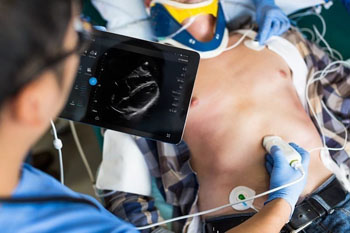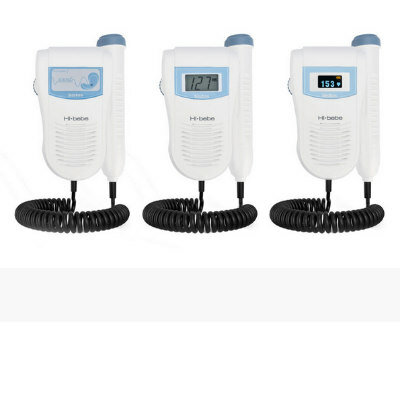Innovative Transducer Expands Emergency Cardiac Ultrasound
|
By MedImaging International staff writers Posted on 04 Nov 2016 |

Image: The S4-1 POC cardiac transducer and Lumify system (Photo courtesy of Philips Healthcare).
A new portable transducer frees physicians in emergency care situations of time and mobility restrictions incurred by locating an available ultrasound cart.
The Royal Philips (Philips; Amsterdam, The Netherlands) S4-1 is a pocket-sized and lightweight point-of-care (POC) cardiac transducer for the Lumify platform, the Philips smart-device portable diagnostic ultrasound solution. Smaller than a smartphone, the S4-1 transducer and cable together weigh just 152 grams. The introduction of the S4-1 expands Lumify into ambulatory use, with clinical applications expanded to include a full offering of in-demand cardiac, abdominal, thoracic, and OB/GYN imaging.
The S4-1 transducer offers Lumify advanced high-sensitivity and high-resolution, two-dimensional (2D) image quality, along with new exam pre-sets, which allow clinicians to triage and assess their patients for faster, informed decisions. And beyond integrating with everyday technology, such as off-the-shelf compatible smart devices, Lumify uses cloud-enabled technology to connect with picture archiving and communication systems (PACS), shared networks, and system directories. Data is accessible on the Philips HealthSuite Digital Platform, an open and secure, cloud-based IT infrastructure.
“Our vision for smart-device ultrasounds is focused on putting high-quality devices in the hands of more professionals to serve more patients in more locations,” said Randy Hamlin, POC business leader for Philips Ultrasound. “With the S4-1 transducer and clinical pre-sets, Lumify is further extending the reach of ultrasound by delivering exceptional image quality, now for routine cardiac exams, and creating better connections between clinicians and their patients.”
“Lumify is a game-changing innovation,” said emergency ultrasound physician John Bailitz, MD, of the American College of Emergency Physicians (ACEP; Irving, TX, USA). “The affordability, flexibility, and versatility of Lumify make it appealing to those working in emergency settings, and now with the S4-1 cardiac probe and FAST exam pre-sets, we can conduct critical exams at the point-of-care, resulting in more efficient triage of patients.”
The Philips Lumify is a complete, portable ultrasound system intended for a range of specialties and settings. The system is supplied with two transducers and a scanning app that controls several types of ultrasound scans under a monthly subscription plan that includes not only the device and app, but also an entire healthcare ecosystem dedicated to care delivery. Real-time automatic app updates include rollout of new features as soon as they are developed.
Related Links:
Royal Philips
American College of Emergency Physicians
The Royal Philips (Philips; Amsterdam, The Netherlands) S4-1 is a pocket-sized and lightweight point-of-care (POC) cardiac transducer for the Lumify platform, the Philips smart-device portable diagnostic ultrasound solution. Smaller than a smartphone, the S4-1 transducer and cable together weigh just 152 grams. The introduction of the S4-1 expands Lumify into ambulatory use, with clinical applications expanded to include a full offering of in-demand cardiac, abdominal, thoracic, and OB/GYN imaging.
The S4-1 transducer offers Lumify advanced high-sensitivity and high-resolution, two-dimensional (2D) image quality, along with new exam pre-sets, which allow clinicians to triage and assess their patients for faster, informed decisions. And beyond integrating with everyday technology, such as off-the-shelf compatible smart devices, Lumify uses cloud-enabled technology to connect with picture archiving and communication systems (PACS), shared networks, and system directories. Data is accessible on the Philips HealthSuite Digital Platform, an open and secure, cloud-based IT infrastructure.
“Our vision for smart-device ultrasounds is focused on putting high-quality devices in the hands of more professionals to serve more patients in more locations,” said Randy Hamlin, POC business leader for Philips Ultrasound. “With the S4-1 transducer and clinical pre-sets, Lumify is further extending the reach of ultrasound by delivering exceptional image quality, now for routine cardiac exams, and creating better connections between clinicians and their patients.”
“Lumify is a game-changing innovation,” said emergency ultrasound physician John Bailitz, MD, of the American College of Emergency Physicians (ACEP; Irving, TX, USA). “The affordability, flexibility, and versatility of Lumify make it appealing to those working in emergency settings, and now with the S4-1 cardiac probe and FAST exam pre-sets, we can conduct critical exams at the point-of-care, resulting in more efficient triage of patients.”
The Philips Lumify is a complete, portable ultrasound system intended for a range of specialties and settings. The system is supplied with two transducers and a scanning app that controls several types of ultrasound scans under a monthly subscription plan that includes not only the device and app, but also an entire healthcare ecosystem dedicated to care delivery. Real-time automatic app updates include rollout of new features as soon as they are developed.
Related Links:
Royal Philips
American College of Emergency Physicians
Latest Ultrasound News
- Diagnostic System Automatically Analyzes TTE Images to Identify Congenital Heart Disease
- Super-Resolution Imaging Technique Could Improve Evaluation of Cardiac Conditions

- First AI-Powered POC Ultrasound Diagnostic Solution Helps Prioritize Cases Based On Severity

- Largest Model Trained On Echocardiography Images Assesses Heart Structure and Function
- Groundbreaking Technology Enables Precise, Automatic Measurement of Peripheral Blood Vessels
- Deep Learning Advances Super-Resolution Ultrasound Imaging
- Novel Ultrasound-Launched Targeted Nanoparticle Eliminates Biofilm and Bacterial Infection
- AI-Guided Ultrasound System Enables Rapid Assessments of DVT
- Focused Ultrasound Technique Gets Quality Assurance Protocol
- AI-Guided Handheld Ultrasound System Helps Capture Diagnostic-Quality Cardiac Images
- Non-Invasive Ultrasound Imaging Device Diagnoses Risk of Chronic Kidney Disease
- Wearable Ultrasound Platform Paves Way for 24/7 Blood Pressure Monitoring On the Wrist
- Diagnostic Ultrasound Enhancing Agent to Improve Image Quality in Pediatric Heart Patients
- AI Detects COVID-19 in Lung Ultrasound Images
- New Ultrasound Technology to Revolutionize Respiratory Disease Diagnoses
- Dynamic Contrast-Enhanced Ultrasound Highly Useful For Interventions
Channels
Radiography
view channel
Novel Breast Imaging System Proves As Effective As Mammography
Breast cancer remains the most frequently diagnosed cancer among women. It is projected that one in eight women will be diagnosed with breast cancer during her lifetime, and one in 42 women who turn 50... Read more
AI Assistance Improves Breast-Cancer Screening by Reducing False Positives
Radiologists typically detect one case of cancer for every 200 mammograms reviewed. However, these evaluations often result in false positives, leading to unnecessary patient recalls for additional testing,... Read moreMRI
view channel
Low-Cost Whole-Body MRI Device Combined with AI Generates High-Quality Results
Magnetic Resonance Imaging (MRI) has significantly transformed healthcare, providing a noninvasive, radiation-free method for detailed imaging. It is especially promising for the future of medical diagnosis... Read more
World's First Whole-Body Ultra-High Field MRI Officially Comes To Market
The world's first whole-body ultra-high field (UHF) MRI has officially come to market, marking a remarkable advancement in diagnostic radiology. United Imaging (Shanghai, China) has secured clearance from the U.... Read moreNuclear Medicine
view channel
New PET Biomarker Predicts Success of Immune Checkpoint Blockade Therapy
Immunotherapies, such as immune checkpoint blockade (ICB), have shown promising clinical results in treating melanoma, non-small cell lung cancer, and other tumor types. However, the effectiveness of these... Read moreNew PET Agent Rapidly and Accurately Visualizes Lesions in Clear Cell Renal Cell Carcinoma Patients
Clear cell renal cell cancer (ccRCC) represents 70-80% of renal cell carcinoma cases. While localized disease can be effectively treated with surgery and ablative therapies, one-third of patients either... Read more
New Imaging Technique Monitors Inflammation Disorders without Radiation Exposure
Imaging inflammation using traditional radiological techniques presents significant challenges, including radiation exposure, poor image quality, high costs, and invasive procedures. Now, new contrast... Read more
New SPECT/CT Technique Could Change Imaging Practices and Increase Patient Access
The development of lead-212 (212Pb)-PSMA–based targeted alpha therapy (TAT) is garnering significant interest in treating patients with metastatic castration-resistant prostate cancer. The imaging of 212Pb,... Read moreGeneral/Advanced Imaging
view channelBone Density Test Uses Existing CT Images to Predict Fractures
Osteoporotic fractures are not only devastating and deadly, especially hip fractures, but also impose significant costs. They rank among the top chronic diseases in terms of disability-adjusted life years... Read more
AI Predicts Cardiac Risk and Mortality from Routine Chest CT Scans
Heart disease remains the leading cause of death and is largely preventable, yet many individuals are unaware of their risk until it becomes severe. Early detection through screening can reveal heart issues,... Read moreImaging IT
view channel
New Google Cloud Medical Imaging Suite Makes Imaging Healthcare Data More Accessible
Medical imaging is a critical tool used to diagnose patients, and there are billions of medical images scanned globally each year. Imaging data accounts for about 90% of all healthcare data1 and, until... Read more
Global AI in Medical Diagnostics Market to Be Driven by Demand for Image Recognition in Radiology
The global artificial intelligence (AI) in medical diagnostics market is expanding with early disease detection being one of its key applications and image recognition becoming a compelling consumer proposition... Read moreIndustry News
view channel
Hologic Acquires UK-Based Breast Surgical Guidance Company Endomagnetics Ltd.
Hologic, Inc. (Marlborough, MA, USA) has entered into a definitive agreement to acquire Endomagnetics Ltd. (Cambridge, UK), a privately held developer of breast cancer surgery technologies, for approximately... Read more
Bayer and Google Partner on New AI Product for Radiologists
Medical imaging data comprises around 90% of all healthcare data, and it is a highly complex and rich clinical data modality and serves as a vital tool for diagnosing patients. Each year, billions of medical... Read more




















